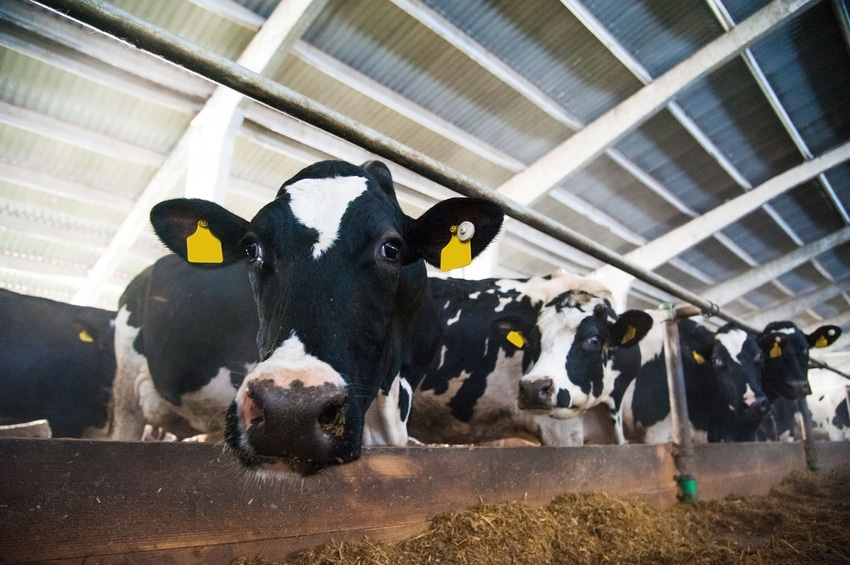Danone announces ambitious methane reduction plan
Company targets 30% reduction in methane emissions from fresh milk used in its dairy products.
January 17, 2023

Danone, a leading food company and one of the world’s largest dairy companies, announces today a global action plan to reduce absolute methane emissions from its fresh milk supply chain by 30% by 2030. Danone expects to remove 1.2 million tons carbon dioxide equivalent of methane emissions by 2030. This ambitious plan builds on the progress Danone has been making in recent years, already reducing its methane emissions by c. 14% between 2018 to 2020.
A reduction in methane emissions will have immediate benefits for the climate that reductions in carbon dioxide cannot achieve on their own, according to the IPCC. Dairy production from cattle makes up an estimated 8% of total human-caused methane emissions, as part of agriculture and livestock activities which represent approximately 40% of global methane emissions.
As a leader of the dairy category, Danone is determined to play its role to reduce methane emissions, focusing on:
working with farmers to implement regenerative dairy practices and develop innovative solutions;
collaborating and partnering with peers, governments and Environmental Defense Fund to scale innovation, reporting and advance financing models;
advocating and engaging with governments to improve methane policies, data and reporting as well as funding for research and to support farmers transitioning to regenerative dairy practices.
With today’s announcement, Danone is the first food company to set a methane reduction target and align with the ambition of the Global Methane Pledge launched at COP26. The company will report on its methane emissions, as part of its extra financial disclosure.
“Dairy products are an affordable source of nutrition for many people, at the core of our mission to bring health through food. As one of the largest dairy companies, we take the challenge of both producing more [to feed a growing population] and greatly reducing emissions and impact on climate,” stated Antoine de Saint-Affrique, chief executive officer of Danone.
He continued, “This step change requires a collective effort. Working with farmers, partners and governments, we have the power and duty to build farming models that benefit the climate and society, taking a step forward to tackling global warming together.”
Transitioning to regenerative dairy
Danone works directly with 58,000 dairy farmers across 20 countries and has already supported projects for dairy farms in 14 countries, through its regenerative agriculture program, initiatives such as Farming for Generations and with Danone Ecosystem.
While these projects are holistic in nature, with benefits on biodiversity, soil quality and reduction of the use of chemicals in farming, reduction of GHG emissions - including methane - has been a priority.
“We will continue to accelerate our efforts across geographies and across diverse farming systems, working hand-in-hand with dairy farmer partners. In 2023, we will launch four new initiatives for methane reduction in Africa, Europe and the United States,” the company said.
Collaboration and partnerships
Danone is launching a partnership with Environmental Defense Fund, a global non-profit environmental organization working in nearly 30 countries. Environmental Defense Fund will work with Danone on:
Improving science, data and reporting for agricultural methane emissions to ensure climate benefits are real and durable.
Advocating for action from the dairy industry and governments to prioritize agricultural methane solutions.
Advancing innovative financing models, such as co-funding models between companies and governments, to deploy farmer-friendly solutions, faster.
“Cutting methane emissions is one of the fastest and most effective ways to slow climate change. The dairy sector can play an important role in driving these reductions while boosting farmer livelihoods and increasing food security and nutrition,” said Fred Krupp, president of EDF. “Danone is the first food company raising this type of ambition, but it can’t be the last. This is the decisive decade for climate action. We invite other food companies, farmers and policymakers to join us on a path toward 2030 climate results.”
Danone is also a founding partner of Farming for Generations (F4G), a global alliance which brings together companies specializing in animal health and welfare, animal nutrition, crop nutrition and science and artificial intelligence, as well as NGOs like World Wildlife Fund for Nature, Compassion in World Farming, and Wageningen University. F4G has developed a practical toolbox of best-in-class solutions for dairy farmers, including solutions for methane reduction. These include factsheets and other resources dedicated to enteric emissions reduction, herd optimization, and manure management.
Working with governments
Danone considers that policy is critical to unlocking systemic solutions to support dairy farm transformation, from supporting research and innovation, to co-financing, to ambition-setting, to driving a level playing field.
Danone North America is working closely with the U.S. Department of Agriculture to support farmers in reducing methane emissions though a comprehensive regenerative strategy where improved manure management strategies create methane reductions and improve fertilizer use on cropland.
In Europe, Danone is supporting the European Commission’s Climate Neutral Farms (ClieNFarm) project to co-develop and upscale systemic locally relevant solutions to reach climate neutral, resilient, and sustainable farms across Europe.
Danone has also worked with the Algerian government to support smallholder farmers to improve farming practices, working with 1,500 farmers since 2015.
You May Also Like


.png?width=300&auto=webp&quality=80&disable=upscale)
